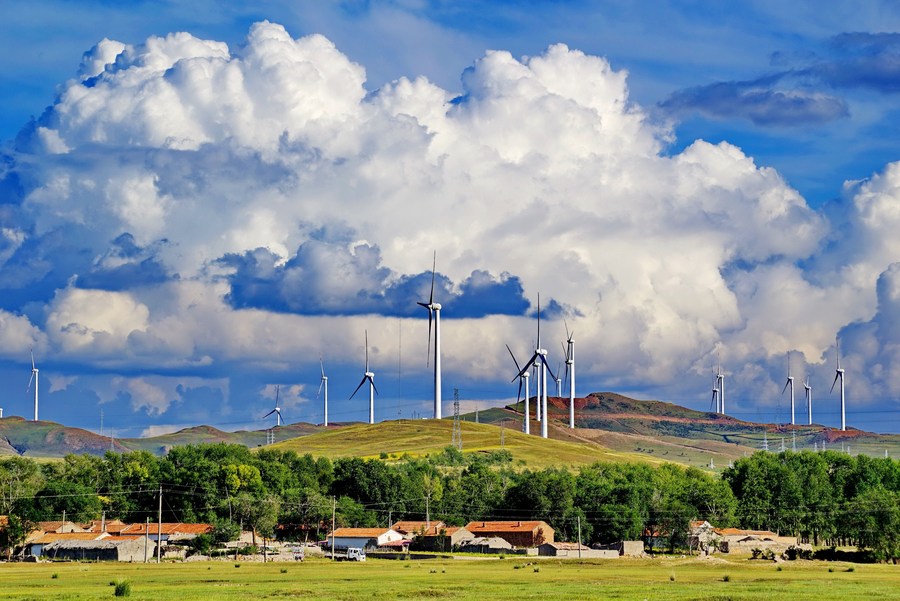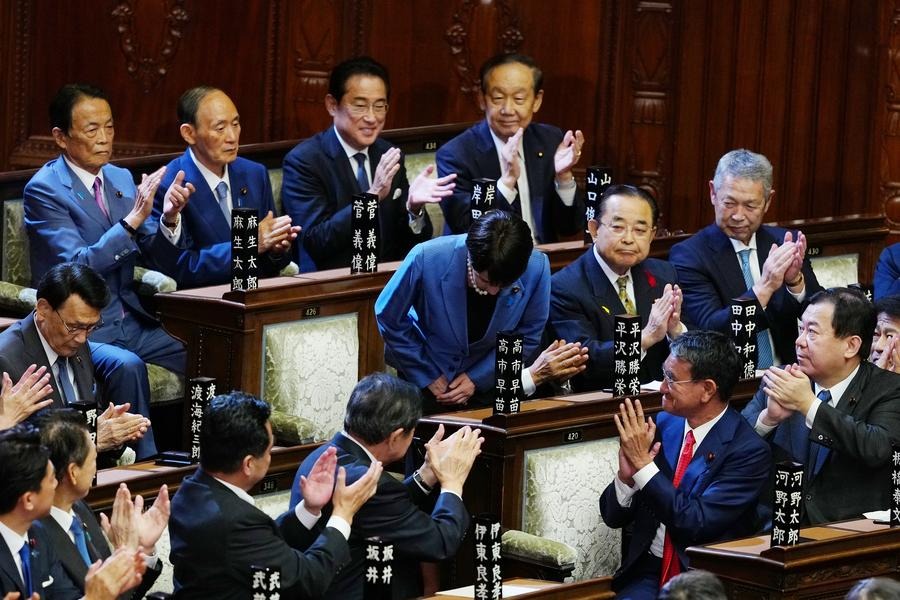Leaders Summit on Climate should deliver big results


US President Joe Biden, during his election campaign, promised to hold a world leaders' summit on climate change within 100 days of assuming office. He is about to fulfill that promise by holding the Leaders Summit on Climate on Thursday and Friday.
At the summit, the Biden administration intends to galvanize efforts by the world's major economies "to reduce emissions during this critical decade to keep a limit to warming of 1.5 degree Celsius within reach". Themes will also include elevating the economic benefits of climate action, including job creation, mobilizing public and private finance, adapting to and mitigating climate change, incorporating nature-based solutions, and developing transformational technologies.
Forty world leaders have been invited to the summit, including those from 17 major economies responsible for about 80 percent of global emissions and global GDP, and some from countries particularly vulnerable to the impacts of climate change or leading ambitious climate actions.
Global milestone in climate fight
The summit will serve as a critical global milestone on the road to the 26th UN Climate Change Conference in Glasgow, Scotland, in November before which countries are expected to pledge stronger national climate commitments under the Paris Agreement. It will also give Biden the opportunity to re-establish the United States as a leader in global climate diplomacy.
Four key factors will determine the summit's success.
First, the US should commit to cut its greenhouse gas (GHG) emissions 50 percent below 2005 levels by 2030 and significantly increase climate finance to tackle the climate challenge and help spur a strong and equitable economy. Biden is expected to announce a new emission-reduction target for 2030 at or before the summit, which will be part of the US national climate commitment under the Paris Agreement, known as Nationally Determined Contribution. Biden should also use the occasion to show the US will lead on cutting highly potent methane emissions.
Studies conducted by a range of organizations show that a 50 percent target can be achieved cost effectively with existing technologies and would greatly contribute to job creation and innovation across a range of sectors, including renewable energy, sustainable transport and electric vehicles.
For example, rapid electrification of the economy, which is essential for cutting emissions, could support up to 25 million good-paying jobs over the next 15 years and save the average household about $2,000 a year. Emission reduction would also help the US avoid the economic costs of climate damage.
Second, major economies should unveil 2030 emission targets that align with net-zero emission trajectories. Countries especially well positioned to announce stronger climate targets are those that have pledged to achieve net-zero emissions around the middle of this century, but have yet to set a NDC targets for 2030 that align with their long-term emission goals. They include Japan, the Republic of Korea, Canada and China.
China needs to make clear its intention to deliver a 2030 target that aligns with its pledge to achieve carbon neutrality before 2060. Also, by strengthening its NDC this year, along with sectoral and provincial plans, China can reassure the world that it is serious about addressing the climate crisis.
During the just-concluded China-France-Germany virtual climate change summit, President Xi Jinping said China has decided to ratify the Kigali Amendment to the Montreal Protocol. The amendment aims to phase down worldwide production of hydrofluorocarbons, greenhouse gases that are more potent than carbon dioxide as a contributor to climate change.
However, China should also take measures in its NDC to adopt a topline target on non-CO2 emissions, including highly potent methane emissions, which at present are not addressed in China's 2030 targets.
Other countries, including India, Indonesia and South Africa, should also use the global platform to indicate their intention to set more ambitious targets. And while all countries may not be ready to deliver their national plans at the summit, it is important that they signal their commitment to bolder climate action ahead of the Glasgow climate conference and contribute to reducing the impacts of climate change.
Need to ramp up climate finance
Third, countries need to ramp up climate finance for developing countries and stop funding coal. The Biden administration has said it will produce a climate finance plan for the US to strategically use different financial institutions to help developing countries take ambitious climate actions.
Helping developing countries to generate and use clean energy, protect forests and build resilience to impacts of climate change is essential.
So the plan should indicate how the US will scale its climate finance to catch up with the efforts of other major donors that contribute more on a per-capita and share-of-gross-national-income basis. It must also include a recommitment to the Green Climate Fund, including how the US will deliver the $2 billion in unpaid funding pledged in 2014 and making a new pledge to match other countries that recently doubled their contributions.
By increasing climate finance, the US can put pressure on other developed countries to make new climate finance commitments. For example, Canada and Italy are the lowest providers of climate finance in the G7 and therefore should do more to catch up to their peers. And other developed countries should increase their adaptation finance to reach a balance with mitigation funding called for in the Paris Agreement.
Climate action finance should be increased
Biden's finance plan will also need to address how the US will use its own institutions, such as the Development Finance Corporation, and push international organizations such as the World Bank to increase finance for climate action and shift funding away from activities that are not aligned with the Paris Agreement-especially fossil fuels.
And fourth, countries should commit to greening their post-pandemic economic recovery plans. In more than a year since the COVID-19 pandemic broke out, countries have spent $16 trillion to respond to the crisis. While a few countries, mostly in Europe, have seized the opportunity to address the economic crisis and climate change together, the majority of the post-pandemic stimulus measures are propping up the business-as-usual economy.
In the past year, governments announced more stimulus support for fossil fuels than for clean energy. This is a terrible misstep, because research shows a dollar spent on clean energy infrastructure or ecosystem conservation creates more jobs and has an economic return that is two to seven times higher than if it were spent on unsustainable sectors. And yet after a drop in global CO2 emissions for most of last year because of lockdowns, emissions in December 2020 had crept up to levels higher than that in December 2019.
Chance to increase global resilience
The Leaders Summit on Climate offers a chance for the world to reset and commit to a more climate-friendly, resilient and just recovery from the pandemic. As host, the US has a responsibility to set the tone. Recent developments show it is doing so.
Other major economies, too, should share how they intend to take advantage of the jobs and economic gains from clean energy, nature-based solutions and other low-carbon projects while stopping the bail-out of carbon-intensive businesses.
If governments commit to green recovery, these packages can form the foundation for stronger NDCs and ambitious climate actions in the coming decade, building the necessary clean energy infrastructure to help decarbonize the global economy.
The leaders' summit comes on the heels of a UN report outlining how countries' emission-reduction commitments are collectively falling far short of what is needed to prevent the most dangerous impacts of climate change.
This summit offers an opportunity for the world's largest economies to either announce ambitious new climate targets or at least signal that they will adopt stronger plans ahead of the negotiations at the Glasgow conference.
The world will be watching.
The authors are senior climate change experts with the World Resources Institute. The views don't necessarily represent those of China Daily.


































